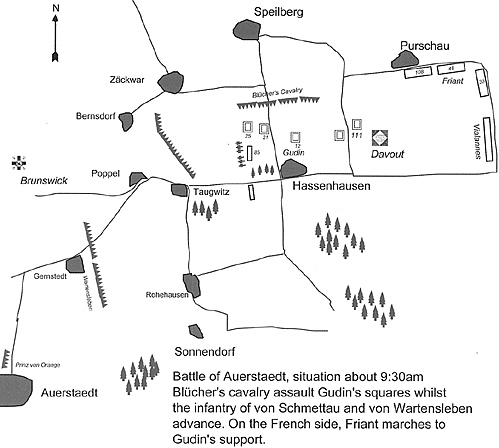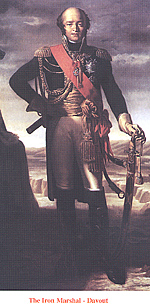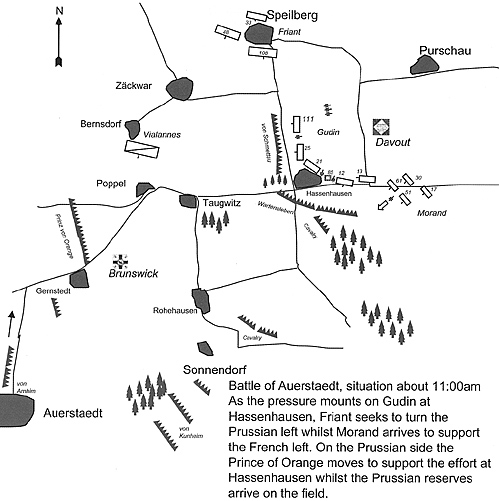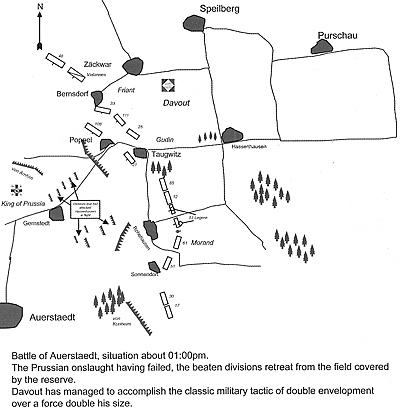Jena Auerstadt
A Day of Lost Opportunities
Battle of Auerstadt
by Patrick E. Wilson
| |
Having got clear of a huge traffic jam in Auerstädt village, General von Blucher led his troopers towards and through the village of Hassenhausen. Beyond that he encountered Marechal Davout’s advance guard and a brisk fight in the dense fog ensured. The French under General Gudin came out on top and even captured five of General von Blucher’s field pieces. General Gudin also moved on Hassenhausen and secured it with elite companies. Meanwhile General von Blucher had been joined by more cavalry squadrons and commenced a series of attacks upon General Gudin, who formed several squares and fought off the attacks by Cuirassiers, Dragoons and Hussars, though not without loss. Prussian Side On the Prussian side General Reitzenstein was injured at the head of his regiment and General von Blucher had a horse shot from under him. General von Blucher’s charges were not in vain though, as they had occupied General Gudin whilst the leading Prussian infantry division under General Schmettau deployed and began its advance once it had got through the chaos of Auerstädt. General Schmettau though approached Hassenhausen much the same way as General Grawert had approached Vierzehnheilgen. Pushing back French skirmishers his halted outside the village and began volley fire that did minimal harm to the French sheltered by houses, hedges and fences. It seems no one could summon the courage to order up a bayonet charge. Still the pressure they exerted compelled Marechal Davout to bring the 21st and 12th Ligne regiments into the village in support. He was of course also able to do this because of the arrival of General Friant’s division, which he ordered, to the right of Hassenhausen to take the villages of Speilberg and Poppel. Another reason for Schmettau’s hesitation to storm Hassenhausen could have been an unfortunate event (an unnerving one at that) which occurred about this time.
It seems that in the fog some French Chasseurs a Cheval squadrons blundered into Schmettau’s division as it was advancing upon Hassenhausen, in the subsequent confusion a friendly fire incident had occurred and this perhaps accounts of the inaction of Schmettau’s division. General Schmettau himself was later mortally wounded and this can not have helped the situation.
[6]
The French were now however to experience the crisis of the day when General Schmettau’s men were joined first by General Wartensleben’s division and then that of the Prince of Orange. General Wartensleben arrived at about 9.00 am with his division and advanced on General Schmettau’s right, aiming to turn General Gudin out of the village of Hassenhausen. He made an excellent start, his Irwing Dragoon
regiment pounced upon General Gudin’s 85th Ligne, to the south of Hassenhausen, and routed it. Fortunately for General Gudin, General Wartensleben’s infantry were a little slow in following up this victory and Marechal Davout had the 12th Ligne in position when they did attempt to storm Hassenhausen. General Wartensleben then followed General Schmettau’s example in trying to out shot the 12th Ligne and the remnants of 85th Ligne to the south of Hassenhausen, sadly this would take time and that General Wartensleben did not have (although he was not aware of it).
The French meanwhile reinforced General Gudin’s right with 111th and 108th Ligne, whilst General Friant with another brigade of infantry captured the village of Speilberg after a sharp fight and then began to bear down on the flank and rear of General Schmettau’s division.
To relieve General Schmettau the Prussian high command made an error of momentous portions, as the Prince of Orange advanced with his division it was split in two, one brigade under Prince Henry of Prussia moved to support General Schmettau’s left, whilst another under Colonel von Lützow went to support General Wartensleben. Again the Prince of Orange’s deployment and advance like those of General Schmettau and General Wartensleben had taken time because of the necessity to pass through the chaos of Auerstädt village.
This need not have mattered had the whole of the Prince of Orange’s division been deployed on either flank, where the presence of such a force of fresh troops must have brought victory there! Instead the troops were used to support a fight that had already sucked in two divisions; still the added pressure almost bought results. General Gudin’s 21st Ligne clung on grimly in Hassenhausen, Friant’s movements were contained and the 85th and 12th Ligne were in grave danger of being overrun. Indeed it looked good for the Prussian cause, another half an hour and! It was not to be though, for Marechal Davout was saved by the timely arrival of General Morand’s division.
Perceiving General Morand’s advancing battalions Prince Wilhelm of Prussia quickly attacked with all the cavalry he had at hand, which was at least thirty Squadrons strong. Leading the Red Hussars of General von Blucher’s regiment, Prince Wilhelm of Prussia attacked with the same enthusiasm of General von Blucher himself and achieved exactly the same results. The Red Hussars were decimated, Prince Wilhelm’s horse was killed and he himself was wounded. The supporting Heavy cavalry the Life Cuirassiers, Life Carabiniers and other Cuirassier regiments fared little better but mounted charge after charge. Their charges were ill organised and in the face of General Morand’s solid squares served only to exhaust the Prussian cavalry. Had the Prussian cavalry been as organised as say those regiments that Murat led at Austerlitz, then the result
may have been different, especially if horse artillery had accompanied the attack. This is shown by the fact that the horse battery of Willman, which had accompanied Prince Wilhelm’s attack, did force back one of General Morand’s squares with its fire.
However, General Morand’s squares beat off the Prussian cavalry and their defeat meant that General Wartensleben’s division and Colonel von Lützow’s brigade had to pull back and break off their attack upon Hassenhausen. General Morand’s division then went over to the attack, the 51st and 61st Ligne advanced upon Rehausen and 17th and 30th Ligne advanced upon the Sonnenberg. It was to be a difficult advance, as from the very first moment they were met by a hail of fire. The 51st Ligne advancing on Rehausen itself found Colonel von Lützow’s troops dogged opponents and lost heavily before finally pushing Colonel von Lützow out of Rehausen.
The 61st Ligne, fighting to the left of 51st Ligne, endured almost point blank cannon fire and was nearly overwhelmed by a Prussian counter-attack. Indeed the regiment was only saved by the intervention of a battalion of the 30th Ligne. The 17th and 30th Ligne engaged elements of the Prussian Guards on the as they sought to turn General Wartensleben’s division. The Guards had advanced forward from the Prussian reserves to cover the retreat of the Prussian front line and in this they succeeded though at a cost. The Prussian retreat never degenerated into a rout like that of Jena. However General Morand did capture Auerstädt by the end of the day. Meanwhile on the Prussian left, General Friant had also commenced his attack. This attack collided with the advance of Prince Henry of Prussia’s brigade and a bitter struggle now ensured for the village of Poppel. At first General Friant’s 108th Ligne held it but Prince Henry’s brigade took it and compelled General Friant to reinforce the 108th Ligne with the 33rd Ligne, who together took it back again. Prince Henry, though reinforced himself by two Grenadier battalions, soon found that he had to fall back when General Schmettau’s division began to fall back in response to events to their right. Prince Henry and General Schmettau’s men now fell back via Gernstadt and Auerstädt as General von Arnim’s division of reserve moved up to cover their retreat. General von Arnim managed to hold the front long enough for the troops of the Prussian left to get away but they in turn were compelled to retire from the field as they found themselves turned.
The French still held the field of battle, they were exhausted and their troops had dropped down to sleep amongst the dead and dying of this amazing battle. Marechal Davout had achieved a victory that ensured a place for himself in Military History. A quarter of his Corps d’Armée were
‘Hors de Combat’ but the Prussians had lost many more including their Commander-in-Chief, the Duke of Brunswick.
The fact that the Prussians should have easily won this battle should not escape our attention, the dense early morning fog undoubtedly aided the French, as did the chaos and confusion that ensued as a result of the Prussians using the road through Auerstädt. Prussian deployment was slow and uncoordinated too but that should not take away one iota of the praise that is due the French 3rd Corps d’Armée for its tactics and deployment throughout the engagement. The Duke of Brunswick’s Prussian Army had been presented with a marvelous opportunity to inflict a serious defeat upon the French by annihilating Marechal Davout’s Corps d’Armée. That they failed to do so demonstrated not only bad luck but also a clear lack of direction in the upper echelons of commend in the Prussian Army of this period. The wounding of both the Duke of Brunswick and General Schmettau early on did not help of course!
Jena Auerstadt: A Day of Lost Opportunities Introduction
|
 Thirteen miles away that day the Duke of Brunswick’s main Army encountered Marechal Davout’s 3rd Corps d’Armée near the village Auerstädt. The day, like that at Jena, had begun in thick fog that was more advantageous to the French then the Prussians. The Prussian advance guard under General Gebhard von Blucher, strangely enough, began its day in the rear of the army. Only a few squadrons of it managed to force their way to the front under General von Blucher’s leadership.
Thirteen miles away that day the Duke of Brunswick’s main Army encountered Marechal Davout’s 3rd Corps d’Armée near the village Auerstädt. The day, like that at Jena, had begun in thick fog that was more advantageous to the French then the Prussians. The Prussian advance guard under General Gebhard von Blucher, strangely enough, began its day in the rear of the army. Only a few squadrons of it managed to force their way to the front under General von Blucher’s leadership.
 Davout: The Iron Marshal.
Davout: The Iron Marshal.
 General Morand immediately detached his 13th Legere regiment to Hassenhausen to support General Gudin’s hard pressed division, especially the shaky 21st Ligne in Hassenhausen. Having succoured his colleagues at Hassenhausen, General Morand, with Marechal Davout
himself, moved to Gudin’s left directly against General Wartensleben’s right. But before he could do so he was assailed by a massed cavalry charge led by Prince Wilhelm of Prussia. This cavalry had assembled to the south of General Wartensleben’s division in readiness to support the anticipated Prussian breakthrough.
General Morand immediately detached his 13th Legere regiment to Hassenhausen to support General Gudin’s hard pressed division, especially the shaky 21st Ligne in Hassenhausen. Having succoured his colleagues at Hassenhausen, General Morand, with Marechal Davout
himself, moved to Gudin’s left directly against General Wartensleben’s right. But before he could do so he was assailed by a massed cavalry charge led by Prince Wilhelm of Prussia. This cavalry had assembled to the south of General Wartensleben’s division in readiness to support the anticipated Prussian breakthrough.
 The retreat soon became general as General Kalkreuth, the Reserve Commander, struggled to maintain some sort of order but disheartened the troops began to hurry from the field. General Kalkreuth finally halted at Buttstedt with what troops he could keep within the ranks but many had fled the colours for the moment.
The retreat soon became general as General Kalkreuth, the Reserve Commander, struggled to maintain some sort of order but disheartened the troops began to hurry from the field. General Kalkreuth finally halted at Buttstedt with what troops he could keep within the ranks but many had fled the colours for the moment.